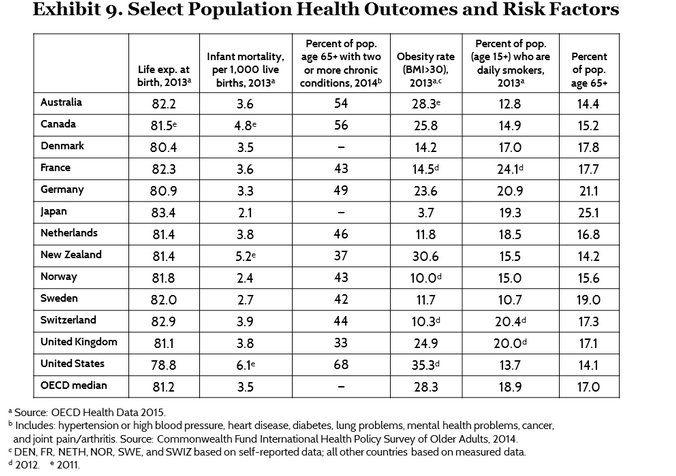The Commonwealth Fund has just released its latest report on health care spending and quality. The findings once again reveal that we spend way more per person on health care per person than other wealthy nations with far poorer outcomes. Interestingly, the U.S. is the only wealthy nation without a universal publicly-funded health care system.
Most likely, you cannot answer most of these 11 questions about our health care system. But, the answers provide good food for thought about new directions we should consider to benefit people in the United States.
- What do we spend on average per person? In 2013, $9,086.
- What did the typical U.S. resident spend out of pocket? $1,074. French residents spent $277.
- What was the average private insurance premium in the U.S.? $3,442, five times more than Canada, which spent the next most, $654.
- How does spending in the U.S. compare with other wealthy countries? The next closest country in spending, Switzerland, spent about 30 percent less, $6325.
- Why do we spend so much on health care? Primarily because we use more medical technology and pay higher prices and not because we see the doctor or visit the hospital more often.
- How does our drug spending compare? In 2010, all other countries had lower prices; prices in the United Kingdom, Canada and Australia were about half of what we paid.
- What portion of our economy is healthcare spending? 17.1 percent.
- What portion of the economy is healthcare spending for the next closest country, France? 11.6 percent.
- What’s the average life expectancy in the U.S.? 78.8 years.
- What’s the average life expectancy in 12 other wealthy nations? At least 2 years more.
- What portion of the U.S. economy goes to housing support, job programs, retirement and disability benefits, food assistance and other social services? Only 9 percent, far less than other wealthy nations and about half of what France, Germany, Sweden and Switzerland spend. Of note, every other wealthy nation spent a higher portion of their GDP on social services than on health care.
Findings are based on 2013 data from the Organization of Economic Cooperation and Development.











Another extremely expensive part of our medical care is the layer of administrators that our insurance system uses. I’ve read that up to 40% of our healthcare dollar goes to administrative expenses: paying the salaries of those people who do coverage checking, utilization reviewers and other gatekeepers. Other nations don’t have nearly the same level of administrative expense because many other developed countries have accepted that every one has to have coverage (single payer) and they’re not wasting time trying to deny coverage on technicalities.
I once worked for a major HMO in the Medical Services Division, where all proposed treatments and procedures recommended by doctors for its members were debated and either approved or disapproved. The plethora of people who were employed in the department was ridiculous, and even though I was only on temporary assignment, I was paid a very good hourly wage. I can only imagine how much high-level managers, medical professionals and executives were earning annually. The number of personnel and amount of time spent investigating the cases being decided was so lengthy and involved, it likely would have been less costly to just go ahead and approve most of the procedures, medications or treatments without all this baloney, because the process merely added to what the HMO was charging its customers in premiums. Honestly, it was ridiculous. You’re 100% right that the administrative costs involved with America’s health insurance services is more expensive than in other countries, while providing less comprehensive care. I know, because I witnessed this process firsthand!
It is not only the private insurance companies spending money to check and pay for services but the doctors offices and all service providers need office staff to cope with the demands of billing.A single non profit system would greatly reduce billing costs.
Health services need more regulation and cost controls akin to energy, water and sewer services.